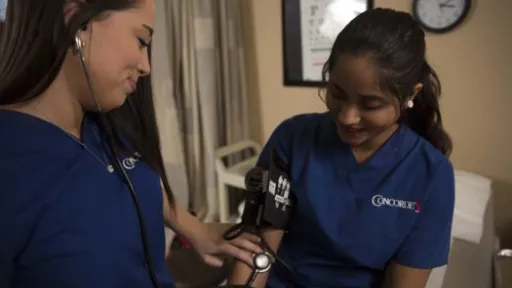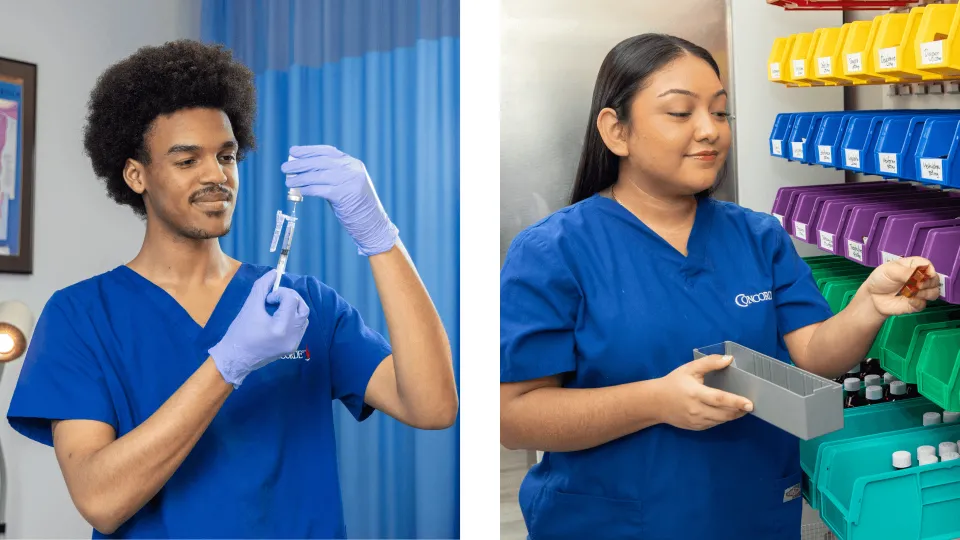
In many doctors' offices and clinics, medical assistants help keep things running smoothly by supporting doctors, nurses, and office staff. Medical assisting positions usually combine administrative and clinical work. A medical assistant may split their time between the front office and the exam room, working with other healthcare professionals to deliver quality patient care. If this sounds like a good career for you, keep reading to learn more about medical assistants' duties, their work environment, and the educational paths available to become one.
Job Responsibilities

Medical assistants don't treat patients, but they perform clinical and administrative tasks to help doctors and other staff, including:
- Scheduling appointments: Medical assistants answer phone calls and emails to schedule patients' appointments and may send appointment reminders to patients.
- Handling billing and insurance: Many medical assistants process payments and fill out patients' insurance forms.
- Preparing exam rooms: Between exams, medical assistants clean and sanitize the rooms to keep patients and staff safe.
- Taking vital signs: A medical assistant can take patients' vital signs, such as their blood pressure, weight, and temperature.
- Recording patients' medical histories: Medical assistants use questions to record patients' medical histories, such as asking if patients are currently taking any medications.
- Preparing patients for exams: Before exams, medical assistants meet with patients to answer questions and explain procedures.
- Administering medications: Under the direction of a doctor or nurse, medical assistants can administer medications to patients or give injections, such as vaccinations.
- Collecting specimens for laboratory tests: A medical assistant may collect specimens, such as blood or urine, and prepare the samples for basic laboratory tests.
- Changing wound dressings: Some medical assistants provide basic wound care, including changing patients' dressings to prevent infections.
- Updating patient records: A medical assistant records and updates a patient's medical information, usually in an electronic health record system.
Related: 5 Things an MA Does in a Typical Day
Related: Medical Assistant Duties
Work Environment
Medical assistants can work in a variety of healthcare settings. While they often work in doctors' offices, many other facilities also hire these healthcare professionals. The U.S. Bureau of Labor Statistics breaks down where most medical assistants work:
- Physicians' offices: 56%
- Hospitals, including state, local, and private: 16%
- Outpatient care centers: 9%
- Other health practitioners' offices: 8%
According to the BLS, most medical assistants work full-time schedules. Depending on where they work, medical assistants may work nights, weekends, and holidays. For example, hospitals are never closed, so they need medical assistants available to work at all times.
Medical assistants typically work eight-hour shifts. This is different from some other healthcare professionals, such as licensed practical nurses, who usually work 12-hour shifts.
Education and Training

While there are no formal education requirements for this role, many employers prefer to hire medical assistants who have completed postsecondary education. If you follow this route to pursue a career in medical assisting, your options include:
- Completing a diploma: Those who want to enter the workforce quickly can complete a medical assisting diploma or certificate. These postsecondary programs typically take around one year to complete and focus on medical assisting topics, such as medical records and intake processing.
- Earning an associate degree: Medical assistants can also earn an associate degree in the field. This postsecondary program usually takes two years to complete, and it involves both medical assisting and general education courses.
Program durations can vary based on the school. For example, at Concorde Career College, our Medical Assistant Diploma program takes as few as nine months to complete, while our associate degree program can take as little as eight months. When deciding which path to choose, think about your preferred timeline and how soon you want to start working.
Besides education, medical assistants may also need to be licensed or certified to work, depending on where they live. Some states require these credentials, according to the BLS. Even if your state doesn't, earning a certification may improve your chances of getting a job after graduation.
Medical assistants can earn certifications through different organizations, including:
- American Association of Medical Assistants: The AAMA offers the Certified Medical Assistant credential for those who have graduated from an accredited postsecondary program. Applicants must also pass an exam.
- National Healthcareer Association: This organization offers both the Certified Clinical Medical Assistant and the Certified Medical Administrative Assistant credentials. Both certifications require applicants to meet education or work experience requirements and pass an examination.
- National Center for Competency Testing: Medical assistants can earn the National Certified Medical Assistant credential through the NCCT. They must have education or training as a medical assistant and pass a certification exam.
Related: How To Become a Medical Assistant
Career Outlook
There's a great job outlook for medical assistants in the near future. The BLS projects that this field will grow by 15% through 2033. That's a much faster growth rate than the average of all occupations in the workforce.
The BLS projects that employers will have about 119,800 jobs for medical assistants each year over the next decade. These jobs may become available as other medical assistants retire or move on to different occupations.
The demand for more medical assistants may also grow as baby boomers get older, developing more healthcare needs. Doctors will need to provide more services, so medical assistants can help lighten the load by handling some administrative and clinical duties.
Career Advancement Opportunities

Becoming a medical assistant can provide a solid foundation for working in healthcare settings. Some medical assistants spend their entire careers in this role, while others advance or transition into other positions.
One common way for medical assistants to grow in the field is by specializing in a medical area. Options for medical assisting specialization include:
- Geriatric care: Medical assistants in this specialization work in clinics or facilities treating elderly people. They're usually skilled in administering medications and helping patients with health insurance.
- Oncology: In this field, medical assistants work in hospitals or oncology centers for patients who have cancer. In addition to their other tasks, they may assist with cancer treatments, such as radiation and chemotherapy.
- Cardiology: Medical assistants specializing in cardiology work with doctors who treat heart-related problems. They may perform specialized tests that require additional training, such as electrocardiograms and drawing patients' blood.
- Pediatrics: Pediatric medical assistants usually work in doctors' offices or clinics that treat babies, children, and teenagers, helping these young patients to feel less scared or nervous.
- Orthopedics: Medical assistants with an orthopedic specialization often work in rehabilitation facilities or sports medicine centers, where patients go if they have muscle or bone issues. When recording patients' information, they may ask questions about patients' injuries or range of movement.
- Ophthalmology: In this field, medical assistants work in offices or clinics providing eye care. They may prepare patients for eye exams and coordinate with vision insurance companies.
Some specializations may require medical assistants to carry out additional training or earn advanced certifications. For example, cardiology medical assistants may need to become certified in phlebotomy, which is the practice of drawing blood.
Besides specializing, medical assistants can also advance their careers in other ways. They can become teachers who work with new or aspiring medical assistants. Some use their administrative knowledge to become medical office managers. Others go on to complete additional education and training for other healthcare roles, such as nursing or physician assisting.
Related: Medical Assistant Certifications
Start Your Education for Medical Assisting Positions
Medical assistants perform clinical and administrative tasks in doctors' offices, hospitals, and other healthcare facilities. There's a growing demand for these healthcare professionals, and the field offers plenty of opportunities for career growth. With various educational pathways and certification options, you can start your future career in medical assisting today.
At Concorde, we offer our Medical Assistant program as both a diploma and an associate degree, so you can choose the best path for you. Depending on the program, you have the opportunity to complete your education in as few as eight months for the AAS program or nine months for the diploma program. For more information or to schedule a campus visit, contact us today.
"Medical Assistants: Work Environment," United States Bureau of Labor Statistics, https://www.bls.gov/ooh/healthcare/medical-assistants.htm#tab-3.
"Medical Assistant vs. Licensed Practical Nurse (MA vs LPN)," Stepful, https://www.stepful.com/post/medical-assistant-vs-licensed-practical-nurse.
"Is a Medical Assistant Degree Required? Does it Exist?" Stepful, https://www.stepful.com/post/is-medical-assistant-degree-required.
"Medical Assistants: How to Become a Medical Assistant," United States Bureau of Labor Statistics, https://www.bls.gov/ooh/healthcare/medical-assistants.htm#tab-4.
"Medical Assistants: Job Outlook," United States Bureau of Labor Statistics, https://www.bls.gov/ooh/healthcare/medical-assistants.htm#tab-6.
"The Complete List of 15 Medical Assistant Specialties," MedAssisting.org, https://medassisting.org/top-15-medical-assistant-specialties/.
Medical Administrative Assistant Certification | CMAA. (n.d.). AscendBase. https://www.nhanow.com/certification/nha-certifications/medical-admin-assistant-(cmaa)
Medical Assistant (NCMA) Certification - National Center for Competency Testing. (n.d.). Www.ncctinc.com. https://www.ncctinc.com/certifications/medical-assistant
Medical Assistants : Occupational Outlook Handbook: : U.S. Bureau of Labor Statistics. (2019, September 4). Bls.gov. https://www.bls.gov/ooh/healthcare/medical-assistants.htm#tab-6
Take The Next Step Towards a Brighter Future
Interested in learning more about our Medical Assistant program?
We have a Concorde representative ready to talk about what matters most to you. Get answers about start dates, curriculum, financial aid, scholarships and more!







